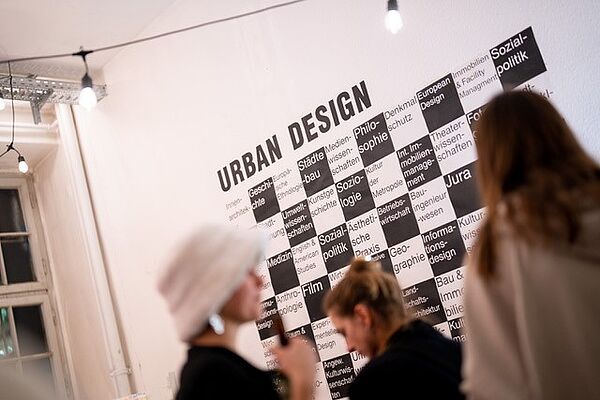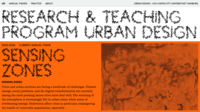Urban Design (UD)
Urban Design M.Sc. at HafenCity University addresses the interrelated and complex social, ecological, political, economic, and spatial issues and challenges of contemporary urban life by critically analyzing their entangled state(s); and creatively engaging with the potential of design in responding to them.
Urban Design prioritizes approaches to the urban as a relationally developed, continuously re/produced, and open process shaped by historical contingencies, various human and non-human agencies, socio-material practices, and spatial imaginaries. The study program Urban Design aims to understand those urban configurations and relevant knowledge(s), thus making them negotiable and tangible to better inform urban transformation processes.
Urban Design approaches design(ing) as a co-produced and care-full practice that not only emerges through individual capacities (of specific disciplines or actors) but also through mediated interrelations and dependencies unfolding in and through urban everyday spaces. Thus, Urban Design orchestrates trans and inter-disciplinary knowledge production in urban and spatial practice and research by accommodating teaching staff and students with backgrounds in architecture, urban planning, urban sociology, anthropology, philosophy, geography, interior design, cultural studies, landscape architecture, and ethnology. What is at stake is to develop a robust analytical and practical framework for urban research, design, and practice by engaging with the complex urban issues of our times.

Studying Urban Design at HCU entails a sound knowledge of research and design practices. The master programme focuses on conceptual modes of working, in-depth analyses, experimental forms of scientific interventions, and process-oriented strategies of planning. The courses convey qualification objectives in the following fields:
- Competencies in the application of various qualitative research and analytic methods in urban research and design praxis
- Ability to do in-depth spatial analysis and integrative application of scientific and artistic methods and perspectives to justify conceptual action
- Competencies in independently handling scientific research
- Organization, moderation, and transfer skills
- Cultivation of team-oriented, integrative, interdisciplinary workflows
- Competencies in cooperative communication skills
- Ability to present and communicate one's own concepts using appropriate media
- Ability to use analog, digital, graphic, and model-building tools for analysis and concept development
- Contemporary urban issues, positions, and theoretical and activist discourses
The Master of Science program is comprised of four semesters. It is divided into five teaching areas that consist of mandatory and elective individual modules.
The Urban Design Project forms the main focus of the program. The project courses run for four semesters. The Urban Design Project is supplemented by a broad spectrum of methods and skills: Methodology (Urban Territories) and Urban Theory (Transformations) are further essential components of the master program in the first year of study.
Students can choose electives from a broad offer in the teaching area Design, Discourses, Techniques & Skills - Specialisation that includes all the study programs at HCU Hamburg and, in this way, focus on their interests. Interdisciplinary Study Programs promote the crossing of disciplinary boundaries to foster change in perspectives. In the third semester, students can choose to study at one of the partner universities of HCU Hamburg (optional).
The study program is completed with an autonomous academic and project-specific master thesis in the fourth semester. At graduation, students are awarded the title "Master of Science" (M.Sc.).
Urban Research & Design – Urban Design Project: Projects are at the center of the study program. Students develop independent analysis, research, and design projects in interdisciplinary working groups.
Urban Theory – Transformations: Courses explore the various models of urban theory - from the precursors of modern urbanism to contemporary debates
Methodology – Urban Territories: Courses introduce qualitative research methods from the social and cultural sciences and design.
Design, Discourses, Techniques & Skills - Specialisation: Electives focus on acquiring and strengthening theoretical, methodological, and design skills. Students can choose from various courses offered at the HCU Hamburg degree programs.
Interdisciplinary Study Programs: This inter- and transdisciplinary teaching area is open to participants from all study programs at HCU Hamburg and encourages creative thinking and a flexible mind in classes and projects from natural science and engineering, humanities and social sciences, and design.
The Master's program in Urban Design attracts people from theory and practice backgrounds and a broad range of disciplines and professional fields interested in gaining further qualifications in applied urban research and the design of urban environments. Information on admission regulations can be found here.
Graduates of the consecutive Master's program in Urban Design have a high level of research, planning, and design competence and can move confidently in the complex fields of urban development and urban research. With the degree, graduates are qualified for scientific research and design as well as consulting activities in private-sector institutions and offices (e.g., architecture, urban, regional and environmental planning, landscape architecture and planning), in state, municipal, and civil-society institutions (in the areas of planning, consulting, and transfer) as well as in universities and research institutions (in teaching, research and transfer). Graduates can also obtain admission to doctoral studies with their degrees.
Graduates from the Urban Design M.Sc. program can be admitted to the Chamber of Architects in consultation with the respective organization. A Bachelor's in Architecture, relevant courses at the Master's level, and professional experience are mandatory. Please refer to the professional qualification guideline by the Bundes Architekten Kammer and make use of the study advisory service.
Kurzprofil
Abschluss:
Master of Science
Regelstudienzeit:
4 Semester
Leistungspunkte:
120 CP
Studienbeginn:
Wintersemester
Zulassung:
zulassungsbeschränkt
Lehrsprache:
Deutsch und Englisch
KONTAKT
HafenCity Universität Hamburg
Raum 3.111.1
Henning-Voscherau-Platz 1
20457 Hamburg
Website Studienprogramm
Ausführlichere Informationen finden Sie hier
Aktuell
You can access the newly released fourth edition of our „Circular“, giving insight into the study program here: https://ud.hcu-hamburg.de/about/documents




